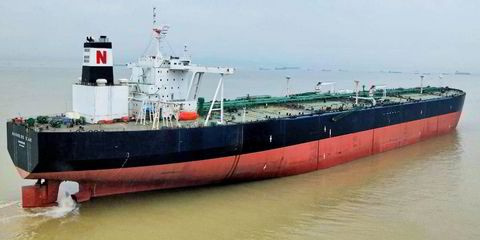While it may take some time for traditional lenders to re-enter the shipping market, alternative financiers are “popping up like mushrooms,” a veteran banker says.
DVB Bank managing director Martin van Tuijl gave delegates a lesson on the new realities of ship finance today at the Association of Ship Brokers and Agents (ASBA) annual cargo conference in Miami Beach.
After tracing the reasons for what he said was a winnowing of some 60 international banks involved in ship finance in 2007 to only “a handful” today, van Tuijl started to describe a scenario that had many banks re-entering.
Then he stopped himself, essentially disagreeing with his own slide.
“Well, I’m not sure about that,” van Tuijl said. “Maybe I should have written ‘alternative lenders.’ Many of the traditional banks are still licking their wounds and it will take time for them to come back.”
The alternative money is coming from a variety of sources including private equity groups and hedge funds, he noted, but with an expectation of interest rates as high as 8% or 9%, he said.
DVB actually occupies something of a middle ground, charging more than the traditional shipping banks that will still lend to top tier clients at between 200 to 300 basis points over the London interbank offered rate (Libor), but less than the alternatives.
As TradeWinds has reported recently, Australian bank Macquarie is making a play in the same middle-ground market.
“They’re popping up like mushrooms,” van Tuijl said of the alternative crowd.
“They’re waiting for the shipowner to be declined by us, or maybe one other bank they can go to, and then all bets are off.”
As van Tuijl notes, gone are the days when favoured owners could borrow at an 80% advance ratio with margins below 300 bps. Today, 50% might be the norm and 60% the limit.
But once margins go above 400 bps, there is some flexibility on the advance ratio, and some owners who need greater leverage to finance a project will be willing to pay what the alternative lenders are charging, he said.
“At those margins, risk-taking power is increasing,” van Tuijl said. “A lender may say ‘OK, I’ll give you 80% but it’s going to cost you 9% (interest).
“Some owners feel that’s attractive, because they may also be able to get a 24- to 36-month period payment free to help them through a tough market. Traditional lenders will not offer that.”
Van Tuijl added, “a large quantum of the industry will have to surrender to a new reality — ‘I can’t get 3% over Libor, I have to pay 7% or 8%.”
In any case, the 16-year DVB veteran insists his bank — which deals almost exclusively with maritime and aviation finance — is not going anywhere.
“We don’t have anything else we can do,” he said. “We’re in this through the thick and thin.”
Following the session, van Tuijl declined comment when TradeWinds asked about Reuters’ reports this week that Germany’s DZ Bank is looking to sell DVB, which booked provisions for loan losses of some $529m in the first six months of the year.
DVB has a $12.5bn shipping portfolio.




